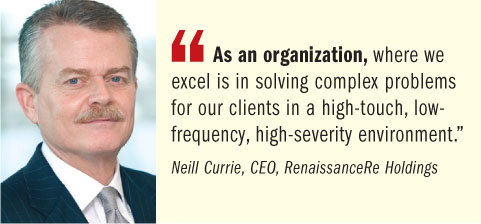When RenaissanceRe decided to enter the specialty-program business early in the last decade, and then the crop-insurance segment years later, such diversification strategies were not popular among Bermuda peers in the property-catastrophe reinsurance market.
 Now, after a line of Bermuda companies followed similar paths, RenRe is abandoning the two specialty markets—selling its U.S. operations to QBE in a $275 million deal announced late last year.
Now, after a line of Bermuda companies followed similar paths, RenRe is abandoning the two specialty markets—selling its U.S. operations to QBE in a $275 million deal announced late last year.
Hours before the company released its official statement that the deal was completed on March 4, RenRe CEO Neill Currie provided NU with some historical perspective, shared his thoughts on why now is the right time for RenRe to make the sale, and revealed his vision for the company and industry in 2011.
Q: When and why did RenRe enter the U.S. specialty insurance market?
Mr. Currie: Going way back, RenRe always had a very small insurance operation, which made use of the same underwriting skills that we have on the reinsurance side—skills to underwrite complex commercial property risks that might have a catastrophic element.
After 9/11, the company wanted to take advantage of market opportunities and really ramped up the insurance operation. As time evolved, we started reducing the cat area and became more diversified.
Q: One source of diversification was RenRe's 2008 acquisition of Agro National, a managing general underwriter of crop insurance. Why have you decided to exit that business?
Mr. Currie: The decision came after a series of changes in the Standard Reinsurance Agreement, essentially reducing potential profitability for insurers participating in the federal crop program.
We had an excellent year this past year—one of our best ever in the crop and the multiperil business. But we believed that scale rather than underwriting expertise was becoming a decisive factor to maximize profitability.
If we were going to stay in the business, we would need to get bigger. We chose to sell. As an organization, where we excel is in solving complex problems for our clients in a high-touch, low-frequency, high-severity environment.
RenRe remains interested in the crop business in the United States and internationally, but as a reinsurer rather than a primary insurer.
Q: Still, some of your Bermuda peers are entering the crop business.
Mr. Currie: There are good reasons to do so. One is that they already have that skill. Another is that for the most part, it can be highly diversifying and a good way to efficiently utilize capital.
One of the things we tell our shareholders—and this has been our history and will be our future, as well—is that we specialize in writing high-severity, low-frequency business. So we need to reward our shareholders for that volatility.
The question is where do you want to be on that efficient frontier: Would you rather have a stable 8 percent or a more volatile double-digit return?
Q: Did the specialty-program operation include casualty business?
Mr. Currie: As time evolved, we continued to have some programs that were very heavily property oriented, but others had a casualty component also, such as nursing homes and day-care centers.
So we did diversify that book more, but program business is a difficult business. And we have been in a pretty soft market for a while. So we were continuing to underwrite that book of business and to winnow it out. Once again, because it's not very efficient to run a small-program business operation, we had to decide—did we want to grow it in a soft market?
As we were thinking through this, QBE happened to be an ideal partner for us in this transaction because not only were they interested in the crop business, but they're one of the larger program writers in the United States.
We sold all of the remaining U.S. programs we had to QBE. So we're no longer in the admitted business in the United States, but we will be open to writing excess and surplus-lines business primarily out of our Lloyd's operation (set up in April 2009). We also have a company, Glencoe, that is licensed to write U.S. E&S business if opportunities come along.
Two other U.S. insurers—Lantana and Stonington—were sold to QBE.
Q: Do you think we will see more U.S. insurance-business exits from Bermuda companies?
Mr. Currie: I am not the best prognosticator, but I can explain RenRe's thinking.
We continue to have one of the higher multiples of market price to book value, and part of the reason for that is that the investor understands what we do. For the last few years, it might have been a little confusing for investors who were wondering what RenRe was doing writing admitted insurance business in the United States. Now it's clearer. They can anticipate the types of business we'll be in.
If they want someone in that high-frequency, low-severity area, they can buy a RenRe. Then they can buy a Progressive on the insurance side and put together their own diversified portfolio instead of investing in a generalist.
It's harder for a company to portray themselves as expert in many lines of business. I'm not saying it's a bad idea, but that's something that managers and boards have to think through—how do they communicate to their investors what they are doing and that they are above average in doing it?
Q: Is there still a rating-agency concern over diversification?
Sure, but not to the extent of driving companies to underwriting business that they may not be expert in.
After KRW [Hurricanes Katrina, Rita and Wilma], companies had losses that were significantly higher than the rating agencies would have believed based upon discussions they had had with companies before. That damages credibility.
The rating agencies came back, and yes, they did talk about diversification quite a bit at that point in time. But I think there were some kneejerk reactions. Some monoline-oriented folks got downgraded, and I think they sort of jumped to the conclusion that that was the reason. Maybe it was more of the fact that the rating agencies were surprised by the losses.
By the same token, I think from our conversations with the rating agencies, we've understood that they want you to be good at what you do.
Want to continue reading?
Become a Free PropertyCasualty360 Digital Reader
Your access to unlimited PropertyCasualty360 content isn’t changing.
Once you are an ALM digital member, you’ll receive:
- Breaking insurance news and analysis, on-site and via our newsletters and custom alerts
- Weekly Insurance Speak podcast featuring exclusive interviews with industry leaders
- Educational webcasts, white papers, and ebooks from industry thought leaders
- Critical converage of the employee benefits and financial advisory markets on our other ALM sites, BenefitsPRO and ThinkAdvisor
Already have an account? Sign In Now
© 2024 ALM Global, LLC, All Rights Reserved. Request academic re-use from www.copyright.com. All other uses, submit a request to [email protected]. For more information visit Asset & Logo Licensing.








